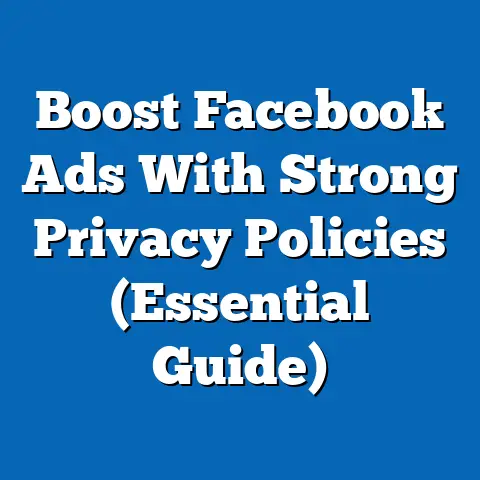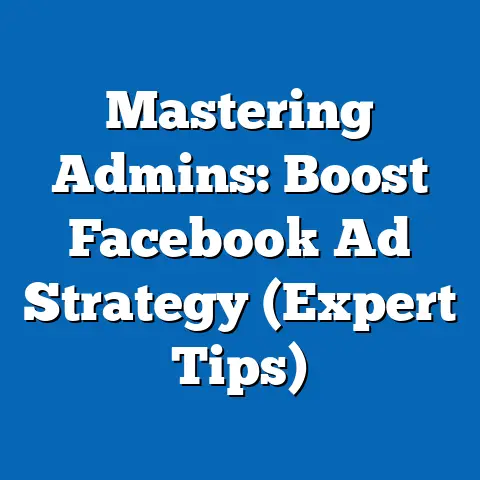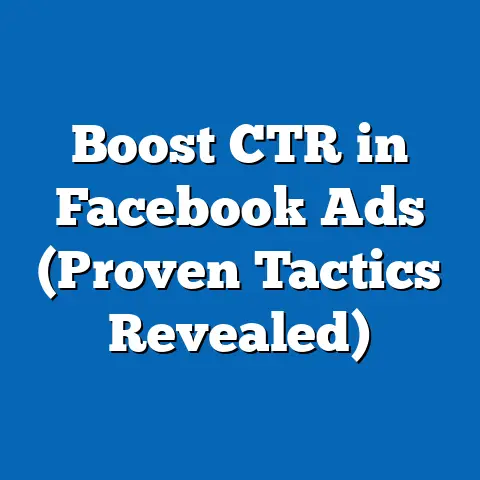Reclaim Facebook Ads Account (Expert Recovery Strategies)
Imagine your business depends on a steady stream of leads and sales generated through Facebook ads.
You wake up one morning, ready to check your campaign performance, only to find a dreaded notification: “Your ad account has been disabled.” Panic sets in.
It feels like being locked out of your own store, helpless as potential customers walk by.
For many businesses, Facebook advertising is the lifeblood of their marketing efforts.
The platform’s unparalleled reach, sophisticated targeting options, and diverse ad formats make it an essential tool for connecting with customers and driving conversions.
According to Statista, Facebook’s advertising revenue reached nearly $116 billion in 2023, proving just how critical the platform is for countless businesses.
However, navigating the world of Facebook Ads isn’t always smooth sailing.
Accounts can be disabled or restricted for various reasons, from unintentional policy violations to suspicious activity or billing issues.
I’ve seen firsthand the frustration and anxiety this can cause, having helped numerous clients navigate this challenging situation.
Understanding Facebook’s Advertising Policies
Facebook’s advertising ecosystem thrives on trust and transparency.
To maintain a positive user experience, Facebook has established a comprehensive set of advertising policies and community standards.
These guidelines govern everything from the types of content allowed to the way ads are targeted and presented.
Compliance with these policies is non-negotiable.
Even unintentional violations can lead to account suspension or restriction.
It’s crucial to understand the rules of the game to avoid costly mistakes and ensure your ads remain in good standing.
Here are some common pitfalls that lead to account suspension:
- Prohibited Content: Ads that promote illegal products or services, discrimination, hate speech, violence, or misinformation are strictly prohibited.
Even seemingly innocuous content can be flagged if it violates these guidelines.
For example, ads promoting weight loss products with unrealistic claims or targeting vulnerable groups can be rejected. - Misleading or Deceptive Practices: Facebook prohibits ads that are deceptive, misleading, or promote scams.
This includes false advertising, bait-and-switch tactics, and exaggerated claims.
Ads must accurately represent the product or service being offered and avoid creating unrealistic expectations. - Violations of Community Standards: Ads must adhere to Facebook’s community standards, which prohibit content that is offensive, abusive, or harmful.
This includes nudity, graphic violence, and content that promotes bullying or harassment. - Circumventing Systems: Attempts to circumvent Facebook’s ad review process, such as using cloaking techniques or creating multiple accounts to bypass restrictions, are strictly prohibited.
- Inaccurate or Misleading Targeting: Ads must accurately target the intended audience and avoid discriminatory practices.
Targeting options must be used responsibly and ethically, avoiding the exclusion of certain groups based on protected characteristics. - Problems with Payment or Billing: Issues with payment methods, such as expired credit cards or billing discrepancies, can lead to account suspension.
It’s essential to keep your payment information up-to-date and address any billing issues promptly.
Real-Life Examples:
- A fitness company ran an ad featuring before-and-after photos with unrealistic claims about weight loss.
The ad was flagged for violating Facebook’s policy against misleading health claims. - A political campaign ran ads that contained misinformation about an opposing candidate.
The ads were removed for violating Facebook’s policy against false or misleading content. - An e-commerce store ran ads that targeted users based on their race and ethnicity.
The ads were rejected for violating Facebook’s policy against discriminatory targeting practices.
I’ve seen firsthand how even well-intentioned advertisers can stumble when they’re not fully aware of the intricacies of Facebook’s policies.
That’s why it’s essential to stay informed and regularly review your ads to ensure they comply with the latest guidelines.
Key Takeaway:
Understanding Facebook’s advertising policies is the first step in preventing account suspension.
Familiarize yourself with the guidelines, stay informed about updates, and regularly review your ads to ensure compliance.
Initial Steps to Take After Account Suspension
Finding that your Facebook Ads account has been suspended can be a jarring experience.
Your immediate reaction might be panic, but it’s crucial to take a deep breath and approach the situation methodically.
Here’s what you should do right away:
Assess the Suspension Reason: The first step is to understand why your account was suspended.
Facebook typically sends a notification or email explaining the reason for the suspension.
Review these communications carefully to identify the specific policy violation or issue that led to the action.Review Facebook’s Policies: Once you know the reason for the suspension, revisit Facebook’s advertising policies and community standards.
This will help you gain a better understanding of the specific rule you violated and how to address it in your appeal.Document Everything: Keep a detailed record of all communications with Facebook, including the date, time, and content of each message.
This documentation can be helpful if you need to escalate the issue or seek further assistance.Keep a Level Head: It’s natural to feel frustrated or angry when your account is suspended.
However, it’s important to remain calm and professional when communicating with Facebook.
Avoid accusatory or confrontational language, as this can hinder your chances of a successful appeal.Avoid Creating New Accounts: Creating new accounts to bypass the suspension is a violation of Facebook’s policies and can lead to further penalties.
Focus on resolving the issue with your existing account rather than attempting to circumvent the system.
Assess the Suspension Reason: The first step is to understand why your account was suspended.
Facebook typically sends a notification or email explaining the reason for the suspension.
Review these communications carefully to identify the specific policy violation or issue that led to the action.
Review Facebook’s Policies: Once you know the reason for the suspension, revisit Facebook’s advertising policies and community standards.
This will help you gain a better understanding of the specific rule you violated and how to address it in your appeal.
Document Everything: Keep a detailed record of all communications with Facebook, including the date, time, and content of each message.
This documentation can be helpful if you need to escalate the issue or seek further assistance.
Keep a Level Head: It’s natural to feel frustrated or angry when your account is suspended.
However, it’s important to remain calm and professional when communicating with Facebook.
Avoid accusatory or confrontational language, as this can hinder your chances of a successful appeal.
Avoid Creating New Accounts: Creating new accounts to bypass the suspension is a violation of Facebook’s policies and can lead to further penalties.
Focus on resolving the issue with your existing account rather than attempting to circumvent the system.
My Experience:
I once had a client whose account was suspended due to a misunderstanding of Facebook’s policy on lead generation ads.
They were collecting personal information without obtaining proper consent.
Instead of panicking, we carefully reviewed the policies, identified the issue, and drafted a clear and concise appeal explaining the steps we had taken to rectify the problem.
Within a few days, the account was reinstated.
Key Takeaway:
Upon receiving an account suspension notice, remain calm, assess the reason, document everything, and avoid creating new accounts.
These initial steps will set the stage for a successful appeal.
Crafting an Effective Appeal
The appeal process is your opportunity to convince Facebook that your account was suspended in error or that you have taken steps to address the underlying issues.
A well-crafted appeal can significantly increase your chances of regaining access to your account.
Here’s a step-by-step guide:
Access the Appeal Form: In your account suspension notification, you’ll typically find a link to the appeal form.
This form is your primary means of communicating with Facebook and presenting your case.Provide Clear and Concise Information: In your appeal, be clear and concise about the reason for the suspension and the steps you have taken to address it.
Avoid rambling or providing irrelevant information.
Focus on the facts and present your case in a logical and organized manner.Acknowledge the Violation (If Applicable): If you believe you made a mistake, acknowledge the violation and express your remorse.
Explain that you understand Facebook’s policies and that you are committed to adhering to them in the future.Explain the Corrective Actions Taken: Outline the specific steps you have taken to rectify the issue that led to the suspension.
This might include removing offending ads, updating your targeting practices, or revising your website content.Demonstrate Understanding of Facebook’s Policies: Show that you have a thorough understanding of Facebook’s advertising policies and community standards.
This will demonstrate your commitment to compliance and increase Facebook’s confidence in your ability to adhere to the rules in the future.Be Professional and Respectful: Maintain a professional and respectful tone throughout your appeal.
Avoid accusatory or confrontational language, even if you believe the suspension was unwarranted.Provide Supporting Documentation: If you have any supporting documentation that can help your case, include it with your appeal.
This might include screenshots of your ads, website content, or communications with customers.
Access the Appeal Form: In your account suspension notification, you’ll typically find a link to the appeal form.
This form is your primary means of communicating with Facebook and presenting your case.
Provide Clear and Concise Information: In your appeal, be clear and concise about the reason for the suspension and the steps you have taken to address it.
Avoid rambling or providing irrelevant information.
Focus on the facts and present your case in a logical and organized manner.
Acknowledge the Violation (If Applicable): If you believe you made a mistake, acknowledge the violation and express your remorse.
Explain that you understand Facebook’s policies and that you are committed to adhering to them in the future.
Explain the Corrective Actions Taken: Outline the specific steps you have taken to rectify the issue that led to the suspension.
This might include removing offending ads, updating your targeting practices, or revising your website content.
Demonstrate Understanding of Facebook’s Policies: Show that you have a thorough understanding of Facebook’s advertising policies and community standards.
This will demonstrate your commitment to compliance and increase Facebook’s confidence in your ability to adhere to the rules in the future.
Be Professional and Respectful: Maintain a professional and respectful tone throughout your appeal.
Avoid accusatory or confrontational language, even if you believe the suspension was unwarranted.
Provide Supporting Documentation: If you have any supporting documentation that can help your case, include it with your appeal.
This might include screenshots of your ads, website content, or communications with customers.
Example Appeal Letter:
Subject: Appeal for Reinstatement of Ad Account [Account ID]
Dear Facebook Ads Team,
I am writing to appeal the suspension of my ad account, [Account ID], which was suspended on [Date] for [Reason].
I understand that my ad [Ad ID] violated Facebook’s policy against [Specific Policy Violation] by [Explain the Violation].
I sincerely apologize for this oversight.
Since receiving the suspension notice, I have taken the following steps to address the issue:
- Removed the offending ad [Ad ID]
- Reviewed Facebook’s advertising policies and community standards to ensure a thorough understanding of the guidelines
- Updated my targeting practices to avoid [Specific Issue]
- Implemented a checklist for all future ad submissions to ensure compliance with Facebook’s policies
I am committed to adhering to Facebook’s advertising policies and community standards and ensuring that my ads are compliant in the future.
I value the opportunity to advertise on Facebook and believe that my ads provide valuable information and services to your users.
I would be grateful if you would reconsider the suspension of my ad account.
I am confident that I can demonstrate my commitment to compliance and that my ads will continue to provide value to Facebook users.
Thank you for your time and consideration.
Sincerely,
[Your Name]
Timelines and Expectations:
After submitting your appeal, it can take Facebook several days or even weeks to review your case.
Be patient and avoid submitting multiple appeals, as this can slow down the process.
Key Takeaway:
Crafting an effective appeal requires clarity, professionalism, and a demonstrated understanding of Facebook’s policies.
Provide clear information, acknowledge the violation (if applicable), explain the corrective actions taken, and maintain a respectful tone.
Additional Recovery Strategies
Contact Facebook Support: Reach out to Facebook Support through the Business Help Center.
Explain your situation and provide any relevant documentation.
While response times can vary, contacting support can sometimes expedite the review process.Utilize Facebook’s Live Chat Feature: Facebook offers a live chat feature for some advertisers.
If you have access to this feature, use it to communicate directly with a Facebook representative and seek assistance with your account recovery.Leverage Facebook Business Manager: If you’re using Facebook Business Manager, ensure that your account is properly configured and that all necessary permissions are in place.
Sometimes, account issues can stem from misconfigured settings or access restrictions.Seek Help from Facebook Ad Specialists or Agencies: Consider consulting with a Facebook ad specialist or agency with experience in account recovery.
These professionals have a deep understanding of Facebook’s policies and procedures and can provide valuable guidance and assistance.Explore Community Forums: Engage with other advertisers in Facebook community forums or online groups.
Sharing your experience and seeking advice from others who have faced similar challenges can provide valuable insights and support.
Contact Facebook Support: Reach out to Facebook Support through the Business Help Center.
Explain your situation and provide any relevant documentation.
While response times can vary, contacting support can sometimes expedite the review process.
Utilize Facebook’s Live Chat Feature: Facebook offers a live chat feature for some advertisers.
If you have access to this feature, use it to communicate directly with a Facebook representative and seek assistance with your account recovery.
Leverage Facebook Business Manager: If you’re using Facebook Business Manager, ensure that your account is properly configured and that all necessary permissions are in place.
Sometimes, account issues can stem from misconfigured settings or access restrictions.
Seek Help from Facebook Ad Specialists or Agencies: Consider consulting with a Facebook ad specialist or agency with experience in account recovery.
These professionals have a deep understanding of Facebook’s policies and procedures and can provide valuable guidance and assistance.
Explore Community Forums: Engage with other advertisers in Facebook community forums or online groups.
Sharing your experience and seeking advice from others who have faced similar challenges can provide valuable insights and support.
Cautionary Tale:
I once worked with a client who had their ad account suspended due to a technical glitch on Facebook’s end.
Despite submitting multiple appeals, they were unable to get the account reinstated.
Frustrated, they reached out to a Facebook ad specialist who helped them escalate the issue through the appropriate channels.
After several weeks of persistence, the account was finally recovered.
Key Takeaway:
If your initial appeal is denied, explore alternative strategies such as contacting Facebook Support, utilizing the live chat feature, leveraging Facebook Business Manager, seeking help from specialists or agencies, and engaging with community forums.
Prevention Strategies for Future Success
Once you’ve successfully recovered your Facebook Ads account, it’s essential to take steps to prevent future suspensions.
Here are some strategies you can implement:
Regular Account Audits: Conduct regular audits of your ad account to ensure that all ads comply with Facebook’s policies.
This includes reviewing ad copy, targeting practices, and website content.Monitor Ad Performance Metrics: Keep a close eye on your ad performance metrics, such as click-through rate, conversion rate, and cost per acquisition.
Unusual fluctuations in these metrics can indicate potential issues with your ads or targeting.Establish a Checklist for Ad Submissions: Create a checklist for all ad submissions to ensure that they adhere to Facebook’s policies before launching campaigns.
This checklist should include items such as:- Verifying ad copy for prohibited content
- Ensuring accurate and transparent targeting practices
- Checking website content for compliance with Facebook’s policies
- Reviewing ad creative for misleading or deceptive claims
Stay Informed About Policy Updates: Facebook’s advertising policies are constantly evolving.
Stay informed about the latest updates and changes by subscribing to Facebook’s official blog or following industry news sources.-
Educate Your Team: If you have a team of marketers working on your Facebook ads, ensure that they are all thoroughly trained on Facebook’s policies and best practices.
Regular Account Audits: Conduct regular audits of your ad account to ensure that all ads comply with Facebook’s policies.
This includes reviewing ad copy, targeting practices, and website content.
Monitor Ad Performance Metrics: Keep a close eye on your ad performance metrics, such as click-through rate, conversion rate, and cost per acquisition.
Unusual fluctuations in these metrics can indicate potential issues with your ads or targeting.
Establish a Checklist for Ad Submissions: Create a checklist for all ad submissions to ensure that they adhere to Facebook’s policies before launching campaigns.
This checklist should include items such as:
- Verifying ad copy for prohibited content
- Ensuring accurate and transparent targeting practices
- Checking website content for compliance with Facebook’s policies
- Reviewing ad creative for misleading or deceptive claims
Stay Informed About Policy Updates: Facebook’s advertising policies are constantly evolving.
Stay informed about the latest updates and changes by subscribing to Facebook’s official blog or following industry news sources.
Educate Your Team: If you have a team of marketers working on your Facebook ads, ensure that they are all thoroughly trained on Facebook’s policies and best practices.
Personal Anecdote:
In my experience, the most effective way to prevent account suspensions is to cultivate a culture of compliance within your organization.
This means making sure that everyone involved in the advertising process understands the importance of adhering to Facebook’s policies and that they have the tools and resources they need to do so.
Key Takeaway:
Maintaining compliance with Facebook’s advertising policies is an ongoing process.
Implement prevention strategies such as regular account audits, monitoring ad performance metrics, establishing a checklist for ad submissions, staying informed about policy updates, and educating your team.
Conclusion
Reclaiming a suspended Facebook Ads account can be a challenging and time-consuming process.
However, by understanding Facebook’s policies, taking prompt action, crafting a compelling appeal, and implementing preventative measures, you can significantly increase your chances of success.
Remember, account recovery is not just about regaining access to your account; it’s also an opportunity to learn and improve your advertising practices.
By cultivating a culture of compliance and staying informed about Facebook’s policies, you can ensure that your ads remain in good standing and that you can continue to leverage the platform’s power to reach your target audience.
Don’t let account suspension discourage you.
Take control of your account, navigate the complexities of Facebook advertising with confidence, and continue to drive results for your business.
The digital marketing landscape is ever-evolving, and your ability to adapt and overcome challenges will ultimately determine your success.






